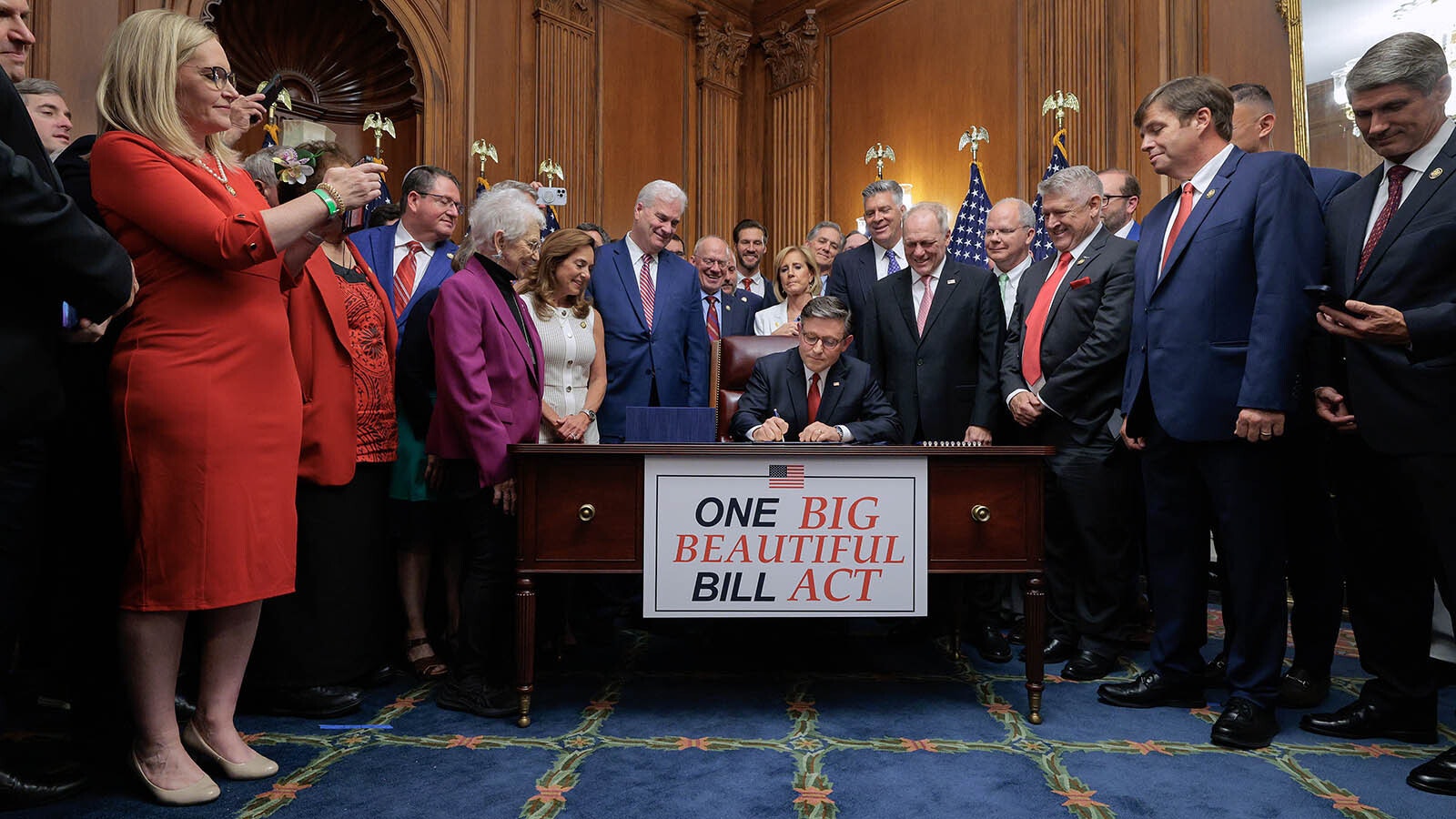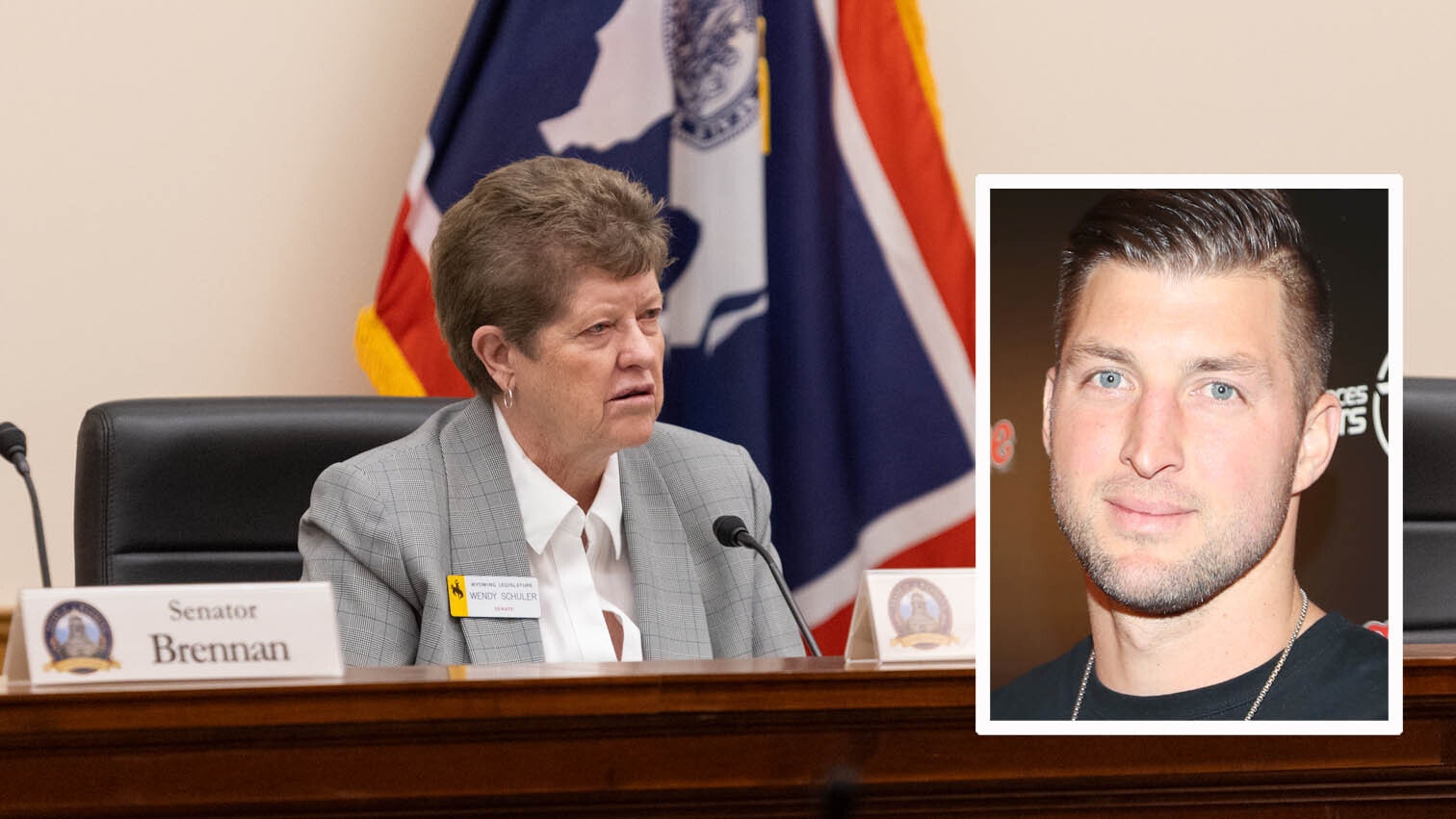WASHINGTON, D.C. — President Donald Trump and the signature legislation of congressional Republicansmade it across the finish line Thursday as GOP leaders made the Fourth of July deadline they set for completing the multitrillion-dollar tax and spending package.
Thursday’s vote in a raucous House was 218-214 in favor of the version the Senate passed two days ago with Vice President J.D. Vance breaking a 50-50 tie. Cheers, boos and applause greeted House lawmakers as they made speeches Thursday.
Republicans still refer to the legislation as the “Big Beautiful Bill,” though Senate Democrats used a procedural tactic to strip the title containing that Trumpian language. Its official name now is The Act.
“The House delivered on what the American people demanded in November — secure borders, energy independence, and lower taxes,” U.S. Rep. Harriet Hageman, R-Wyoming, said in a statement after Thursday’s vote, which came about 12:30 p.m. Wyoming time. “The One Big Beautiful Bill Act is a major win for Wyoming and the entire nation.”
Demonstrating Trump’s influence, the final version calls for a $5 trillion hike to the debt ceiling compared to the original legislation’s $4 trillion — and most of the House’s staunchest conservatives voted for it anyway.
They could have withheld support, causing the package to fizzle out over the holiday, and pressed for less red ink later on.
Two House Republicans voted against the budget bill Thursday: Reps. Thomas Massie of Kentucky and Brian Fitzpatrick of Pennsylvania.
As with Senate Democrats, all House Democrats voted against it. All House members were on hand and there were no abstentions.
The July Fourth deadline had no formal implications to the bill, as the new federal fiscal year does not begin until Oct. 1. But missing their much-touted deadline would have made the Republicans appear in disarray.
Eleventh-hour sweeteners for Alaska were needed to save the bill from tanking in the Senate earlier in the week.
The first words spoken on the floor Thursday by House Speaker Mike Johnson, R-Louisiana, referenced the nation’s founders and their fight for independence — showing the importance the GOP places on symbolism.

Tax Cuts, Immigration, Medicaid
The new law preserves tax cuts enacted in Trump’s first term that were due to expire. It offers more tax relief as well, such as limiting taxes on overtime pay and tips.
It calls for big increases in military and border security spending. It contains incentives for the oil, gas and coal industries.
A sore spot for centrist Republicans: cuts to Medicaid and food stamps, plus other changes bearing on Obamacare that critics say will make health insurance more expensive.
A nonstarter for other Republicans: the $5 trillion in new debt authorized. The Congressional Budget Office has predicted trillions in deficit spending under this law.
U.S. Senate Republican Whip John Barrasso of Wyoming has repeatedly said the measure prevents the largest tax hike in U.S. history. The preserved cuts run across the income spectrum.
Democrats wanted to raise taxes on the wealthiest earners. They also derided the safety-net cuts, which they say will hammer the poor.
Barrasso, a medical doctor, defended the Medicaid changes.
The office of U.S. Sen. Cynthia Lummis, R-Wyoming, released several detailed statements this week on what she calls Wyoming wins in the Senate version. These items benefit the oil, gas and coal industries as well as ranchers and others.
“This legislation reverses years of federal policies that hurt Wyoming’s energy workers and families, instead focusing on real American priorities: expanding domestic energy production, cutting taxes for working families, and backing our ranchers and farmers,” Lummis said in one of the statements.
Wyoming Republican Gov. Mark Gordon issued a statement praising the new law.
“Today’s passage of the long-awaited reconciliation bill — The One Big Beautiful Bill Act — by the U.S. Congress is good for Wyoming,” he said.
“Throughout the process, I worked closely with members of our congressional delegation to hone provisions of the bill of particular importance to Wyoming citizens and our state’s economy. I applaud their diligence,” he said.
‘Kodiak Kickback’
Back-to-back all-night sessions were needed to keep the bill alive in the Senate, as three Republicans defected. A fourth would have sunk the bill.
It’s been widely reported that U.S. Sen. Lisa Murkowski, R-Alaska, was that potential fourth and leveraged GOP leaders’ predicament to secure last-minute goodies for her state. Later, she lamented cuts to safety-net programs and said the House should change the very bill she voted for.
In the midst of the Senate backroom dealmaking, U.S. Sen. Ruben Gallego, D-Arizona, posted to X that GOP leaders were working on a “Kodiak Kickback” for Murkowski. Alaska wound up with a break on Medicaid and food stamp cost-shifting that critics say will burden other states under the law.
The House didn’t change the Senate version.
House Rules Committee Chairwoman Virginia Foxx, R-North Carolina, blocked scores of amendments from House Democrats on Wednesday to set up a clean floor vote on the Senate’s package.
The House took up the bill at about 1:30 a.m. Thursday Wyoming time. House Democratic Leader Hakeem Jeffries of New York hijacked the measure for a while, speaking for more than eight hours.
The House first passed this legislation in May by a single vote, 215-214, sending it to the Senate, which rewrote it and kicked it back. In the end, the chambers had to agree on identical language.
There was talk that the Senate’s version departed too much from the initial House bill. But Johnson pulled it off again, just as Barrasso and the other Senate leadership team members did in that chamber.
As the second-ranking Senate Republican, Barrasso fought hard down the stretch to lose no more than the three GOP defectors: U.S. Sens. Susan Collins of Maine, Rand Paul of Kentucky and Thom Tillis of North Carolina.
Senate Parliamentarian
To move the bill on a simple majority vote in the Senate instead of the 60 needed to advance most legislation in that chamber, Republicans were subject to certain rules on content. The bill was not supposed to stray too far from fiscal issues and into broad policymaking.
Democrats raised numerous points of order against early Senate drafts. The parliamentarian issued a serious of nonbinding opinions — many against the GOP — as to what should be allowed.
“Fury erupts as unelected Senate 'scorekeeper' blocks Trump's agenda,” screamed a Fox News headline June 26.
But Barrasso spokeswoman Laura Mengelkamp told Cowboy State Daily last week that the situation was not so dire. Mengelkamp said a back-and-forth process with lawmakers and the parliamentarian was to hone language.
Fox News reported that at least one Republican called for the parliamentarian to be fired and that another GOP lawmaker called for her rulings to be ignored.
Mengelkamp made no guarantees that the GOP in all cases would adhere to the parliamentarian’s findings. But Mengelkamp was clear that Republicans were working with the unelected referee, not blowing her off.
Due to all the drafting and redrafting, it is not entirely clear how much of the Republican agenda was lost to Democrats’ successful parliamentary challenges.
But Republicans have sounded upbeat.
The centerpiece of their bill — preserving tax cuts — was never threatened. Nor were most major spending provisions. They also won their share of parliamentary challenges.
The first House bill topped 1,000 pages. The version the Senate first brought to the floor was 940.
The final version adopted by both chambers numbers 870 pages.
Sean Barry can be reached at sean@cowboystatedaily.com.





